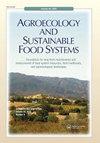ICT4Agroecology: a participatory research methodology for agroecological field research in Tanzania
IF 2.6
3区 农林科学
Q1 AGRICULTURE, MULTIDISCIPLINARY
引用次数: 0
Abstract
Agroecology has become increasingly popular but locally optimized agroecological production methods and information and communication technology (ICT) support tools are limited. This study was conducted at three different geographic locations across Tanzania; we co-developed an integrated participatory field research methodology consisting of two components, each supported by a specifically developed, complementary ICT tool, with maize and cassava as the two focal crops, to examine soil fertility and conservation (compost and mulching), increased biodiversity through intercropping (legumes), and organic pest control measures. Two specifically developed ICT tools, the AgroEco Research application (AER) and AgroEco Analysis application (AEA) were used for data gathering & storage and visualization & statistical analysis, respectively. Further, farmer-managed satellite experiments were performed to further test the research premises and validate their outcomes in the “real world” of smallholder farmers, which was supported by a smartphone application called “Ugunduzi” – enabling farmers to collect, store, and evaluate data generated at different stages of their research. Farmers were free to choose any type, number, and combination of the agroecological practices tested in the field research. This study serves as a methodology reference for a number of companion publications reporting on the findings of this project.农业生态学:坦桑尼亚农业生态实地研究的参与性研究方法
生态农业越来越受欢迎,但本地优化的生态农业生产方法和信息通信技术(ICT)支持工具有限。这项研究是在坦桑尼亚三个不同的地理位置进行的;我们共同开发了一种综合参与式实地研究方法,由两个部分组成,每个部分由专门开发的互补ICT工具支持,玉米和木薯作为两种重点作物,以检查土壤肥力和保护(堆肥和覆盖),通过间作增加生物多样性(豆类),以及有机害虫防治措施。两个专门开发的ICT工具,AgroEco Research application (AER)和AgroEco Analysis application (AEA)分别用于数据收集和存储以及可视化和统计分析。此外,还进行了农民管理的卫星实验,以进一步测试研究前提,并在小农的“真实世界”中验证其结果,这是由一个名为“Ugunduzi”的智能手机应用程序支持的,该应用程序使农民能够收集、存储和评估在其研究的不同阶段产生的数据。农民可以自由选择在实地研究中测试的任何类型、数量和组合的农业生态实践。本研究为报告该项目的研究结果的一些配套出版物提供了方法论参考。
本文章由计算机程序翻译,如有差异,请以英文原文为准。
求助全文
约1分钟内获得全文
求助全文
来源期刊

Agroecology and Sustainable Food Systems
AGRICULTURE, MULTIDISCIPLINARY-GREEN & SUSTAINABLE SCIENCE & TECHNOLOGY
CiteScore
4.80
自引率
7.70%
发文量
73
期刊介绍:
Agroecology and Sustainable Food Systems is devoted to the rapidly emerging fields of agroecology and food system sustainability. By linking scientific inquiry and productive practice with transformative social action, agroecology provides a foundation for developing the alternative food systems of the future. The journal focuses on the changes that need to occur in the design and management of our food systems in order to balance natural resource use and environmental protection with the needs of production, economic viability, food security, and the social well-being of all people.
Agroecology and Sustainable Food Systems examines our current food systems from production to consumption, and the urgent need to transition to long-term sustainability. The journal promotes the study and application of agroecology for developing alternatives to the complex problems of resource depletion, environmental degradation, a narrowing of agrobiodiversity, continued world hunger, consolidation and industrialization of the food system, climate change, and the loss of farm land. The journal uses a food systems approach, and seeks experiences in agroecology that are on-farm, participatory, change-oriented, and backed by broad-based methodologies of sustainability analysis and evaluation.
 求助内容:
求助内容: 应助结果提醒方式:
应助结果提醒方式:


